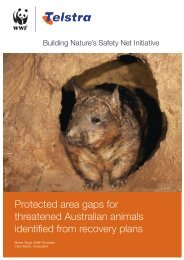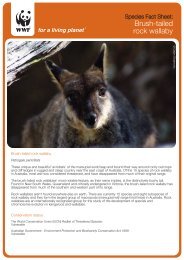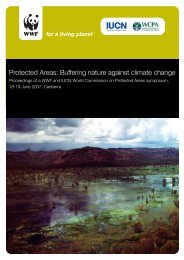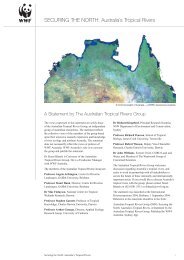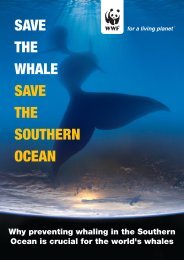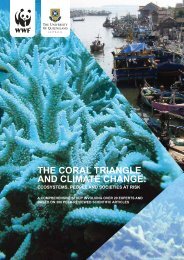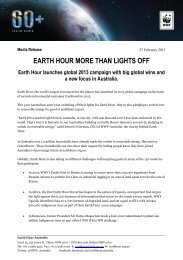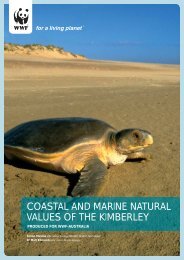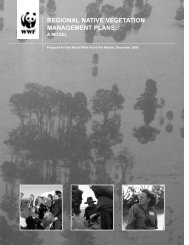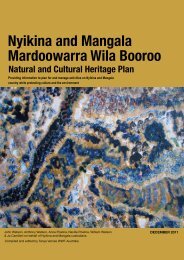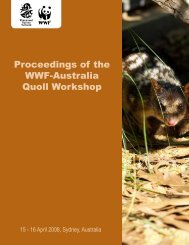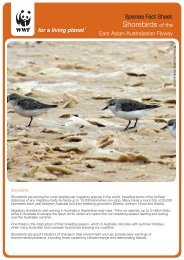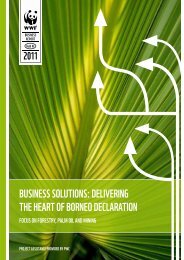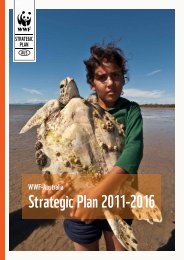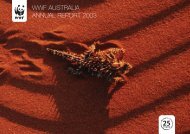Indigenous Peoples and Conservation Organizations
Indigenous Peoples and Conservation Organizations
Indigenous Peoples and Conservation Organizations
You also want an ePaper? Increase the reach of your titles
YUMPU automatically turns print PDFs into web optimized ePapers that Google loves.
Annex 151<br />
<strong>Indigenous</strong> <strong>Peoples</strong> 1 <strong>and</strong> <strong>Conservation</strong>:<br />
WWF Statement of Principles<br />
Principles for partnership between WWF <strong>and</strong> indigenous peoples’ organizations in conserving biodiversity<br />
within indigenous peoples’ l<strong>and</strong>s <strong>and</strong> territories, <strong>and</strong> in promoting sustainable use of natural resources<br />
Preamble<br />
1. Most of the remaining significant areas of high natural value on earth are inhabited by indigenous<br />
peoples. This testifies to the efficacy of indigenous resource management systems. <strong>Indigenous</strong> peoples<br />
<strong>and</strong> conservation organizations should be natural allies in the struggle to conserve both a healthy<br />
natural world <strong>and</strong> healthy human societies. Regrettably, the goals of conserving biodiversity <strong>and</strong> protecting<br />
<strong>and</strong> securing indigenous cultures <strong>and</strong> livelihoods have sometimes been perceived as contradictory<br />
rather than mutually reinforcing.<br />
2. The principles for partnership outlined in this statement arise from WWF’s mission to conserve biodiversity,<br />
combined with a recognition that indigenous peoples have been often stewards <strong>and</strong> protectors<br />
of nature. Their knowledge, social, <strong>and</strong> livelihood systems - their cultures - are closely attuned to the<br />
natural laws operating in local ecosystems. Unfortunately, such nature-attuned cultures have become<br />
highly vulnerable to destructive forces related to unsustainable use of resources, population expansion,<br />
<strong>and</strong> the global economy.<br />
3. WWF recognizes that industrialized societies bear a heavy responsibility for the creation of these<br />
destructive forces. WWF believes that environmental <strong>and</strong> other non-governmental organizations, together<br />
with other institutions worldwide, should adopt strategies with indigenous peoples, both to correct the<br />
national <strong>and</strong> international political, economic, social, <strong>and</strong> legal imbalances giving rise to these destructive<br />
forces, <strong>and</strong> to address their local effects. The following principles aim to provide guidance in formulating<br />
<strong>and</strong> implementing such strategies.<br />
I. Rights <strong>and</strong> Interests of <strong>Indigenous</strong> <strong>Peoples</strong><br />
4. WWF acknowledges that, without recognition of the rights of indigenous peoples, no constructive<br />
agreements can be drawn up between conservation organizations <strong>and</strong> indigenous peoples groups.<br />
5. Since indigenous peoples are often discriminated against <strong>and</strong> politically marginalized, WWF is commited<br />
to make special efforts to respect, protect, <strong>and</strong> comply with their basic human rights <strong>and</strong> customary<br />
as well as resource rights, in the context of conservation initiatives. This includes, but is not<br />
limited to, those set out in national <strong>and</strong> international law, <strong>and</strong> in other international instruments.<br />
In particular, WWF fully endorses the provisions about indigenous peoples contained in the following<br />
international instruments:<br />
• Agenda 21<br />
• Convention on Biological Diversity<br />
• ILO Convention 169 (Convention Concerning <strong>Indigenous</strong> <strong>and</strong> Tribal <strong>Peoples</strong> in Independent<br />
Countries) 2<br />
• Draft UN Declaration on the Rights of <strong>Indigenous</strong> <strong>Peoples</strong> 3<br />
6. WWF appreciates the enormous contributions indigenous peoples have made to the maintenance of<br />
many of the earth’s most fragile ecosystems. It recognizes the importance of indigenous resource<br />
rights <strong>and</strong> knowledge for the conservation of these areas in the future.<br />
7. WWF recognizes indigenous peoples as rightful architects of <strong>and</strong> partners for conservation <strong>and</strong><br />
development strategies that affect their territories.



